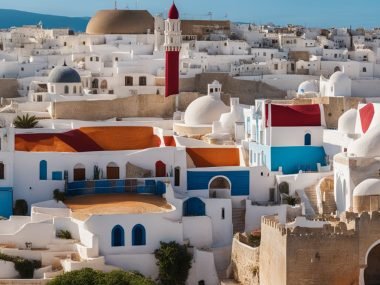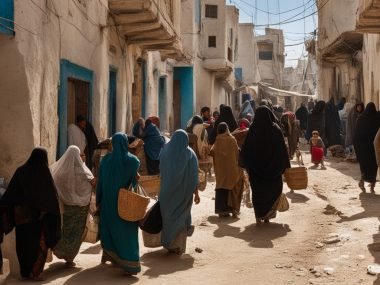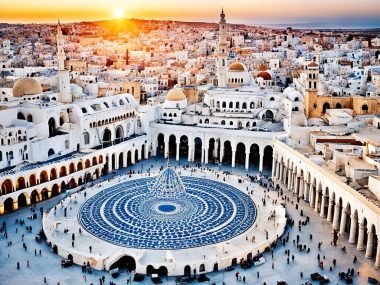Did you know Tunisia has an 81% literacy rate? This is high compared to many developing nations. This fact sheds light on the nation’s progress. But, we still ask: is Tunisia developed? To answer, let’s look at its economy, society, and development indicators.
We need to consider various factors to see if Tunisia is among the world’s developed nations. We look at GDP, economic growth, income distribution, and social progress. Tunisia’s economy is resilient and promising. It’s a vital study for those exploring nation status and growth.
Tunisia’s story is two-sided. It has made great strides in education and infrastructure. Yet, it faces unemployment and income inequality issues. Studying these aspects will give us a better view of Tunisia’s economic and development status.
Key Takeaways
- Higher literacy rate highlights Tunisia’s educational progress.
- Tunisia’s economy shows resilience amid challenges.
- Assessment involves economic, social, and human development indicators.
- Income distribution and unemployment remain critical issues.
- Comprehensive analysis required to understand Tunisia’s development status.
Overview of Tunisia’s Economic Status
Tunisia finds itself at a crucial point. It’s between being a developed and developing economy. It’s in North Africa, so its location matters a lot for its economy and growth.
We learn a lot by looking at economic indicators. They show how the country is doing in important areas. They also show where there’s room to get better. Tunisia’s economy has had ups and downs recently. It’s strong but also gets affected by global economic problems.
Life in Tunisia can be full of opportunities or tough, depending on where you live. Cities are often doing better than countryside areas. This makes it hard to label Tunisia’s economy in a simple way.
Here’s a table that shows key economic details about Tunisia:
| Indicator | Measurement |
|---|---|
| GDP Growth | Varies between 1% – 3% annually |
| Standard of Living Index | Moderate with significant urban-rural disparity |
| Unemployment Rate | 15.3% as of recent statistics |
| Inflation Rate | 3.4% annually |
This summary gives us a clear view of Tunisia’s economic situation. It’s an invitation to look closer at the country’s complex economy.
Historical Context of Tunisia’s Development
To truly get Tunisia’s history, one must explore its past. We look through different times that shaped today. These include the pre-colonial era, battle for independence, and modern days.
Pre-Colonial Era
The pre-colonial time in Tunisia was amazing. It was when ancient civilisations like Carthage thrived. They were great at trade and culture in the Mediterranean. This time was known for good cities, complex societies, and strong economy. It laid the base for Tunisia’s growth. We can still see this era’s wealth in Tunisia’s culture now.
Colonial Influence and Independence
The time under French rule changed Tunisia a lot. It saw big building projects and major changes in society and politics. The drive for freedom led by people like Habib Bourguiba was key. In 1956, Tunisia became a free country. The fight and win for independence shaped the Tunisia of after.

Modern Tunisia
After becoming independent, Tunisia began improving and reforming its economy. The leaders worked on making industry better, changing education, and building more. These steps were key in Tunisia’s growth. Modern Tunisia mixes its rich history with new advances. It keeps growing economically and politically.
Key Economic Indicators in Tunisia
To understand Tunisia’s economic health, we must look at specific factors. These include Tunisia’s GDP, its economic growth, unemployment rates, and how income is shared among its people.
GDP and Economic Growth
Tunisia’s GDP has seen ups and downs, showing both promise and problems. Economic Growth in Tunisia has been steady but not without challenges. Economic reforms have played a big role, yet the growth of GDP has seen ups and downs.
Unemployment Rates
The issue of Unemployment in Tunisia is very important for those making policies. A lot of young people do not have jobs. This situation greatly impacts the country’s social and economic life. Many efforts have been made to provide more jobs. Yet, making a lasting change is still hard.
Income Levels and Distribution
The way Income Distribution works in Tunisia shows two sides. Some people live quite comfortably. Meanwhile, others live with much less. It’s very important to address this gap. Doing so will help Tunisia’s economy to grow in a fair and stable way.
Tunisia’s Human Development Index
The Human Development Index (HDI) shows Tunisia’s growth in a clear way. It compares Tunisia to other countries. It looks at education, health, and living standards. These areas show big steps towards social progress.

Looking closely at HDI Tunisia, we see education has really helped. It has improved reading skills and school success. This helps the country move forward. Health has gotten better too, with people living longer and getting good medical care. Better pay and houses have raised Tunisia’s HDI rank too.
Here is more detail on Tunisia’s HDI scores:
| Indicator | Value | Global Rank |
|---|---|---|
| Life Expectancy at Birth | 76.2 years | 85 |
| Average Years of Schooling | 7.2 years | 95 |
| Gross National Income (GNI) per Capita | $11,964 | 90 |
The Human Development Index is key for seeing Tunisia’s social progress. From what I see, better education, healthcare, and living standards are pushing Tunisia up. This shows amazing progress in society and economy.
Infrastructure Development in Tunisia
Tunisia is growing and modernising quickly. It focuses on improving transport, communication, energy, healthcare, and education. These efforts show its goal to be an economically strong nation.
Transport and Communication
Tunisia wants better connectivity inside and outside the country. It has great roads, ports, and railways for easy travel and trade. Its excellent internet and mobile networks support the nation’s digital needs. Upgrading these areas is key for Tunisia.
Energy and Utilities
Tunisia is broadening its energy mix with traditional and green sources. It’s investing in solar and wind projects to be more sustainable. These efforts boost infrastructure and cut carbon emissions. The nation has also made water and electricity more reliable. This helps homes and businesses.
Healthcare and Education
The nation has made its healthcare system better. It now has top-notch hospitals and clinics. This shows Tunisia cares about its people’s health. Education-wise, Tunisia is doing well too. It has high literacy rates and strong schools that prepare skilled workers. These steps are crucial for Tunisia’s overall growth.
Challenges Faced by Tunisia’s Economy
One big problem for Tunisia is its ongoing fiscal deficit. This has been getting worse because of more public spending and less income. Fixing these issues is key for economic stability.
The country also deals with a lot of foreign debt. This makes its financial situation hard. Economic experts are trying to grow the economy and handle the debt at the same time. Tunisia needs big changes to improve its economy and support steady growth.
The government is trying hard to tackle these problems. The aim is to make the economy stable, spend money wisely, and be ready for future surprises. However, fixing the economy is a complex task. It needs work from many different areas.
To give you an idea, here’s a table showing the main fiscal problems and what’s being done about them:
| Fiscal Issues | Economic Measures |
|---|---|
| High Public Spending | Fiscal Discipline and Budget Reforms |
| External Debt Burden | Debt Management Strategies |
| Need for Structural Reforms | Modernisation of Economic Policies |
Role of the World Bank and International Partnerships
The World Bank in Tunisia and international financial partnerships are very important. They help Tunisia grow. They focus on helping small businesses, fixing the economy, and investing in clean energy. This helps Tunisia have a bright future.
New Country Partnership Framework
The World Bank’s new plan for Tunisia is to help the nation’s economy. It looks at improving government, helping all people, and protecting the environment. Working with international partners makes this plan stronger.
Support for SMEs and Economic Recovery
Helping small businesses is key to getting Tunisia’s economy better. The World Bank and others offer money, advice, and training to small businesses. This helps bring new ideas, more work, and a stronger economy in Tunisia.
Investments in Renewable Energy
Putting money into clean energy is important for Tunisia’s future. The World Bank invests in solar and wind energy in Tunisia. This not only cuts down pollution but also makes energy more secure. It also creates jobs.
| Programme | Area of Focus | Outcome |
|---|---|---|
| SME Development Fund | Financial Support and Training | Increased SME Innovation and Employment |
| Renewable Energy Projects | Solar and Wind Energy | Reduced Carbon Footprint and Job Creation |
| Governance Improvement | Social Inclusion and Environmental Policies | Enhanced Governance and Sustainable Growth |
In summary, the World Bank and its partners play a big role in changing Tunisia for the better. Their work with small businesses, the economy, and clean energy leads to a better future for everyone.
Comparison with Other Developed Countries
To understand Tunisia’s economy, we must compare it with top countries. We look at GDP, HDI, and how much they’ve built up. Tunisia has made great progress in some areas. But it faces big challenges that places like Germany and Japan have beaten.
Tunisia’s GDP per capita is lower than in countries like the USA and the UK. Those countries have more money and do a variety of economic activities. The Human Development Index shows Norway and Switzerland are way ahead. They have better healthcare, education, and life quality than Tunisia.
Yet, Tunisia is doing better in areas like renewable energy and communication. This growth is a good start for improving their economy. Tunisia aims to reach global standards. It wants to improve its position in the world and develop more.







